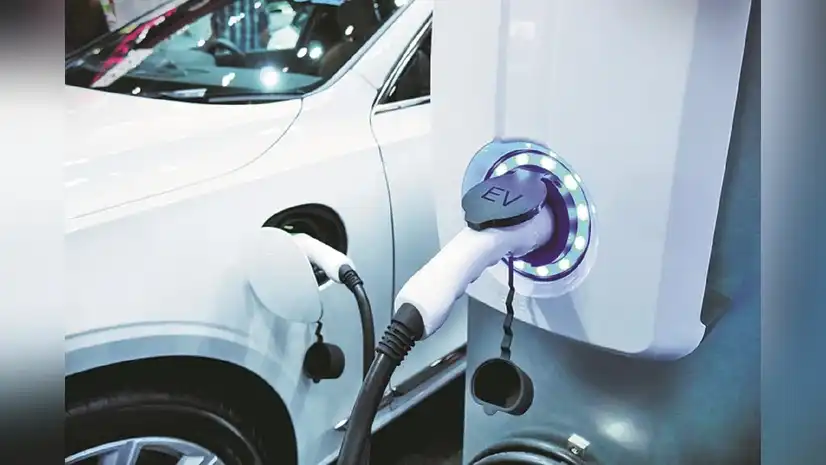Context:
The Uttar Pradesh government decided to include the upstream installation costs of charging stations under its EV subsidy policy in a significant move to promote electric vehicles (EVs).
More On News:
- The decision was made during a meeting of the High-Level Empowered Electric Vehicle Committee (HLEEVC), chaired by the Chief Secretary.
- It is the first time in India that eligible fixed capital investment required to claim a capital subsidy of up to ₹10 lakh per unit.
- It will also include upstream infrastructure costs during the policy period.
- This move represents a major step toward improving the viability and scalability of public charging stations (PCS).
- Invest UP serves as the nodal agency for implementing the policy in the state.
- The amendment to the Uttar Pradesh Electric Vehicle Manufacturing and Mobility Policy–2022 is aimed at resolving a key challenge faced by charge point operators:
- Their difficulty in meeting the minimum fixed capital investment requirement of ₹25 lakh, largely due to the previous exclusion of upstream infrastructure costs from eligible investments.
- The policy provides attractive incentives for charge point operators establishing charging stations in the state.
- These stations are eligible for a one-time capital subsidy on fixed capital investment, which includes costs related to construction, civil works, chargers, upstream infrastructure, battery equipment, utilities, tools, and other associated assets (excluding land expenses).
- The subsidy is offered at a rate of 20%, capped at a maximum of ₹10 lakh per unit.
- Uttar Pradesh has become the first state in the country to provide subsidies for upstream infrastructure in EV charging stations, creating a more investment-friendly environment and accelerating the adoption of electric vehicles across the state
- Uttar Pradesh, India’s third-largest automobile market, has registered over 12,72,206 electric vehicles.
- To maintain this momentum, the state is integrating over 450 charging stations into a GIS dashboard, deploying more than 740 electric buses on major routes, and has identified 116 green routes across 15 cities for the next phase of EV expansion.
- Upstream installation costs:
- In the context of EV charging infrastructure, ‘upstream installation costs’ refer to the expenses involved in establishing the necessary support systems that enable the delivery of electricity to charging stations.
- These costs are separate from the direct expenses of charging equipment (such as chargers and connectors) and may include grid upgrades, transformers, cabling, and other essential electrical components.
Uttar Pradesh EV Policy 2022
- Creation of Charging Facilities
- Capital Subsidy to Service Providers:
- Charging Stations: Minimum investment ₹25 lakh; 20% subsidy up to ₹10 lakh/unit; for first 2000 stations.
- Swapping Stations: Minimum investment ₹15 lakh; 20% subsidy up to ₹5 lakh/unit; for first 1000 stations.
- Government Land: Provided to Govt/Private entities on revenue-sharing @ ₹1/kWh for 10 years.
- Adoption Incentives
- Registration Fees & Road Tax Exemption:
- 100% exemption on EVs purchased & registered in UP for 3 years from policy date.
- 100% exemption on EVs manufactured, purchased & registered in UP in 4th & 5th years.
- Purchase Subsidy Scheme (valid 1 year from notification):
- 2-Wheeler EVs: 15% of ex-factory cost, max ₹5,000 per vehicle; budget ₹100 Cr; max 2 lakh EVs.
- 3-Wheeler EVs: 15%, max ₹12,000; budget ₹60 Cr; max 50,000 EVs.
- 4-Wheeler EVs: 15%, max ₹1 lakh; budget ₹250 Cr; max 25,000 EVs.
- E-Buses (non-govt): 15%, max ₹20 lakh; budget ₹80 Cr; max 400 buses.
- E-Goods Carriers: 10%, max ₹1 lakh; budget ₹10 Cr; max 1000 carriers.
- Manufacturing Incentives
- Capital Subsidy (Base subsidy × Gross Capacity Utilisation Multiple – GCM):

- GCM Definition:
- Year 1: 1 if capacity utilization ≥40%.
- Subsequent years: 1 if peak utilization ≥75%.
- Stamp Duty Reimbursement
- 100% for Integrated EV & Ultra Mega Battery projects.
- For Mega/Large/MSME:
- Poorvanchal & Bundelkhand: 100%
- Madhyanchal & Paschimanchal (except GHZ & GBN): 75%
- GBN & GHZ districts: 50%
- Other Incentives
- Quality Certification Charges: 50% reimbursement up to ₹10 lakh per unit (Large & MSME EV/Battery projects).
- Patent Registration Fees: 75% reimbursement; max ₹50,000 domestic & ₹2 lakh international patents (Large & MSME).
- Skill Development Incentive: Stipend reimbursement ₹5,000 per employee/year for first 50 employees (one-time).

